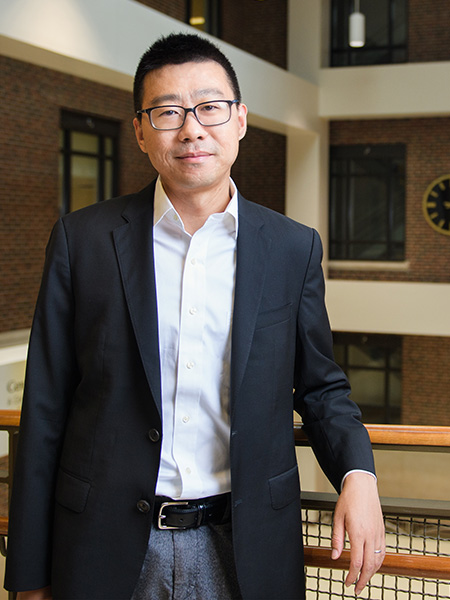Dr. Letian Dou, the Charles Davidson Associate Professor of Chemical Engineering, has been selected for the 2022 Waterloo Institute for Nanotechnology (WIN) Rising Star in Nanoscience and Nanotechnology award.
“I feel extremely lucky to be selected to join this outstanding pool of young scientists awardees. I’m also quite proud that our work is generating significant impacts and being recognized internationally. I sincerely thank the selection committee and Waterloo Institute of Nanotechnology. I’m grateful to my mentors, my students, and my family for their support,” Dou said.
Dr. Lisa Pokrajac, WIN’s Assistant Director Research Programs said Dou stood out among candidates from Asia, Europe, and North America for the 2022 award:
“Each year, WIN receives around 10 applications from around the world, which are evaluated on several factors, such as technical publications and citations, current research program, potential future impact, and strength of references. Professor Dou stood head-and-shoulders above the competitors in each of these categories, making Dou the obvious choice for the Rising Star Award,” Pokrajac said.
Dou submitted his research regarding novel materials for solar energy harvesting and energy-efficient electronic devices that falls within the institute’s key theme areas of smart and functional materials and next generation energy systems. Dou’s research group is working to gain a better understanding of the crystal’s structure that will allow the team to develop stable hybrid semiconductors for solar cells, LEDs, and transistors. While major progress has been made over the last decade in the development of energy applications such as solar cells using halide perovskites, a material that has the same crystal structure as the mineral calcium titanium oxide, their use in practical applications is limited due to weak and dynamic bonds.
WIN honored Professor Dou at the
2022 Research Leaders Celebration, that took place on Friday, December 2, 2022 at the Mike & Ophelia Lazaridis Quantum-Nano Centre. Dou will receive a $5000 CAD honorarium and he will have the opportunity to meet WIN faculty and graduate students, and learn more about the research conducted at WIN. Dou will also give a research presentation as part of WIN’s Distinguished Lecture Series in 2023.
About the Waterloo Institute for Nanotechnology (WIN):
WIN was founded in 2008 to promote the research excellence of the University of Waterloo faculty members in this field, and it is now Canada's largest nanotechnology research institute. Housed in the Quantum Nano Centre, WIN provides a community for nanotechnology researchers and students to share knowledge and ideas that foster innovation. WIN promotes excellence in key theme areas of smart & functional materials, connected devices, next generation energy systems, and therapeutics & theranostics to tackle many global issues aligning with United Nations Sustainable Development Goals. UW is also home to the first and largest Nanotechnology Engineering Program, with approximately 500 students enrolled each year.

